Responding to climate change
- JAC TOP
- Sustainability
- Responding to climate change


Climate change is one of the most significant risks to humanity. If climate change results in severe damages due to rising temperatures or an increased number of natural disasters, both the demand for our services and our cost structure may change, which could lead to a significant impact on our business operations and performance.
We regard climate change as one of our key management risks and in August 2023 we expressed our support for the Financial Stability Board's (FSB) Task Force on Climate-related Financial Disclosures (TCFD). Referring to the TCFD's recommendations, we are (I) establishing a governance structure, (II) identifying and assessing risks and opportunities, (III) Managing risks, (IV) Developing indicators and targets. We will continue to strengthen our efforts and proactively disclose information on climate change in accordance with the TCFD recommendations.

Governance
The company's governance structure defines management's role in assessing and managing climate change-related risks and opportunities as follows:
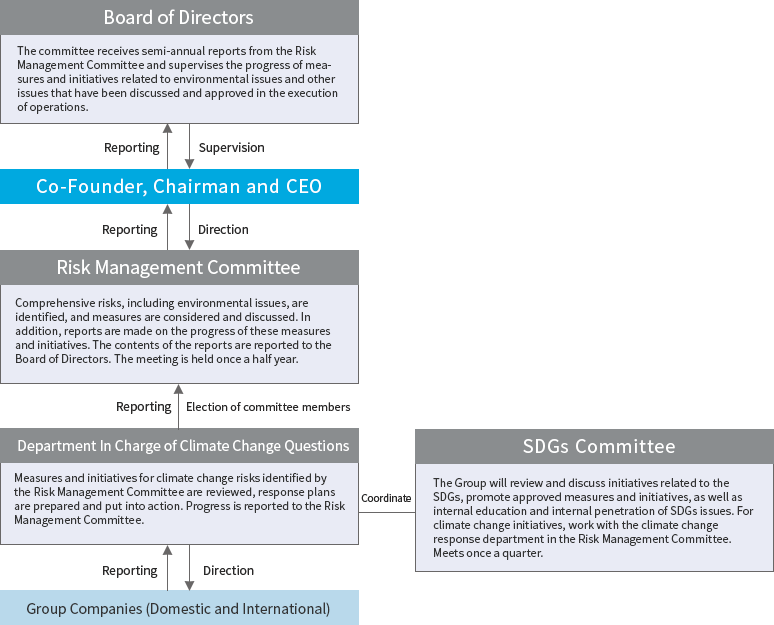
Strategy
We use the 4°C and 1.5°C scenarios published by external organisations such as the International Energy Agency (IEA) and the Intergovernmental Panel on Climate Change (IPCC) as a reference to identify and assess risks and opportunities for the company's operations, and then develop strategies to address them.
Referenced scenarios
-
1.5℃ scenario
- IEA 「NZE(Net Zero Emission by 2050)」
- IPCC 「RCP 2.6」
-
4℃ scenario
- IEA 「STEPS(Stated Policies Scenario)」
- IPCC 「RCP 8.5」
IEA: International Energy Agency
IPCC: Intergovernmental Panel on Climate Change
RCP: Representative Concentration Pathways
Risks and Opportunities
The key opportunities and risks, timescales and financial implications that we have identified and analysed on the basis of the above scenarios are as follows:
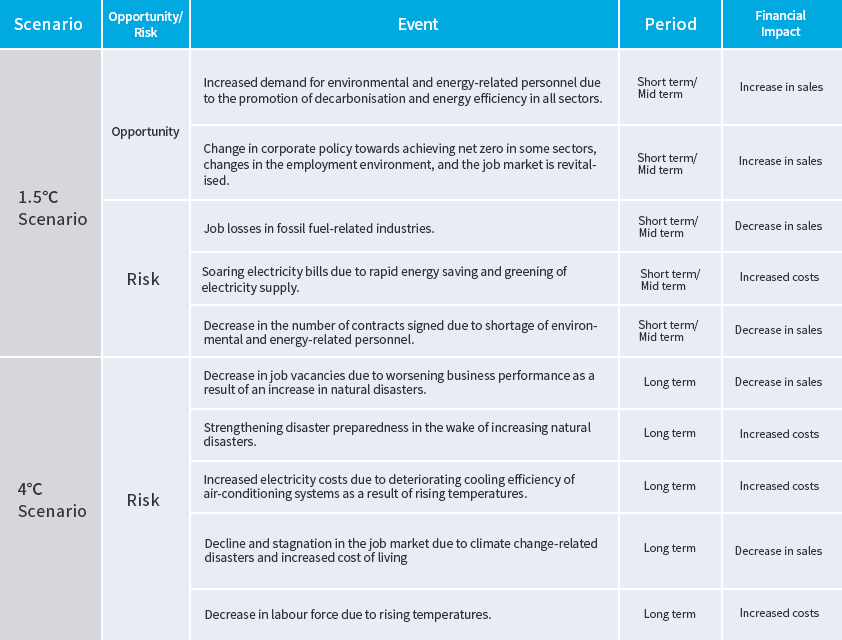
Strategy
1. Diversifying the customer portfolio [Addressing the risk of declining sales].
As the impact of climate change is expected to vary in direction and timing from industry to industry, we will diversify our client portfolio across a variety of industries, so that if climate change impacts reduce demand in a particular industry, we will increase our efforts to in other industries to minimise the impact on our business.
2. Strengthen SDGs recruitment [Initiatives for Opportunities].
To accelerate decarbonisation and energy efficiency initiatives in various companies, there is an increase in mid-career recruitment of SDGs-related professionals, including environment-related professionals. We will seize this opportunity to expand our business by identifying and securing personnel with the relevant skills. By introducing these professionals to companies in need, we will accelerate decarbonisation efforts across society, support the development of innovative technologies and contribute to the prevention of climate change.
3. Promotion of energy-saving activities [To parry increasing costs].
By strengthening energy-saving activities, we will reduce electricity consumption and limit the impact of increased costs associated with increased electricity prices due to climate change.
Risk management
As our operating environment becomes increasingly complex and uncertain, it is essential to accurately deal with risks that could have a significant impact on corporate activities, to effectively carry out the most fitting management strategies and business objectives. The Company regards risk management as an important to enhance corporate value and has established a Risk Management Committee, chaired by the President and CEO.
In addition, climate change risk could have a significant impact on the company's management, and in accordance with this framework, we have narrowed down, monitored and reassessed the key risks.
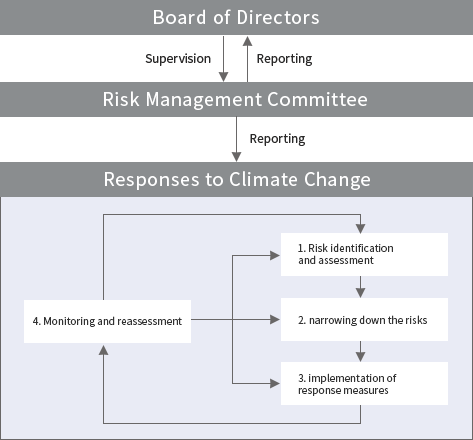
Indicators and targets
As a target, we have set a reduction of greenhouse gas (GHG) emissions to a 'Carbon Net Zero' in 2030 as the total of Scope 1 to 3. In addition to reducing GHG emissions in our business activities and expanding GHG absorption through green electricity procurement and afforestation activities, we will promote carbon net zero in society as a whole through the introduction of human resources that generate innovation.
Current status of GHG emissions
We have been working on the calculation of GHG emissions at all of our domestic and overseas sites and subsidiaries since 2020. Although total GHG emissions of Scope 1 and Scope 2 in FY2022 increased by approximately 3.9% year-on-year due to office floor space increases and the opening of new offices, when combined with the reductions achieved through the greening of electricity at some sites, which started in April 2022, emissions were approximately 324t-GHG (a reduction of approximately 30.5% compared to FY2021).
Scope 3 GHG emissions for Categories 2, 3, 5, 6 and 7 were calculated based on costs (monetary values) and were approximately 3,427t-GHG (an increase of 74.7% compared to FY2021). In addition, the company and all its entities as a whole has obtained a third-party guarantee (Socotec Certification Japan K.K.) from FY2021 to FY2023.
Independent Assurance Report (2023)(PDF:979KB)
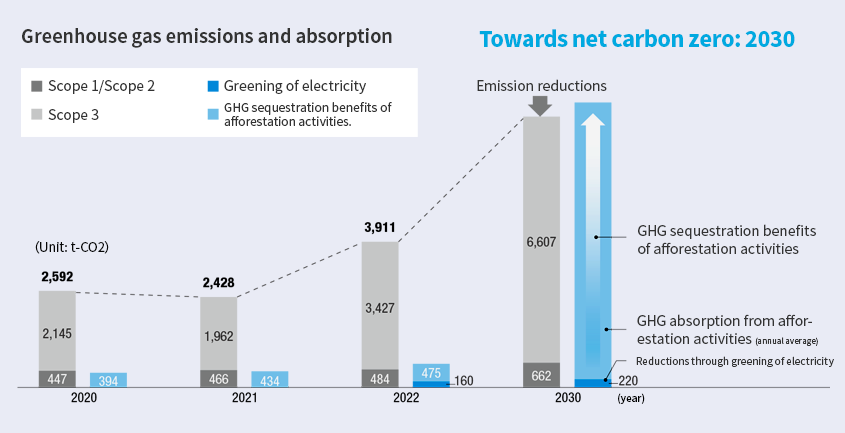
Initiatives to reduce GHG emissions and other emissions
The following initiatives have been implemented and have been effective in reducing GHG emissions and other emissions. In the future, we will accelerate these initiatives to help us achieve carbon net zero in 2030.
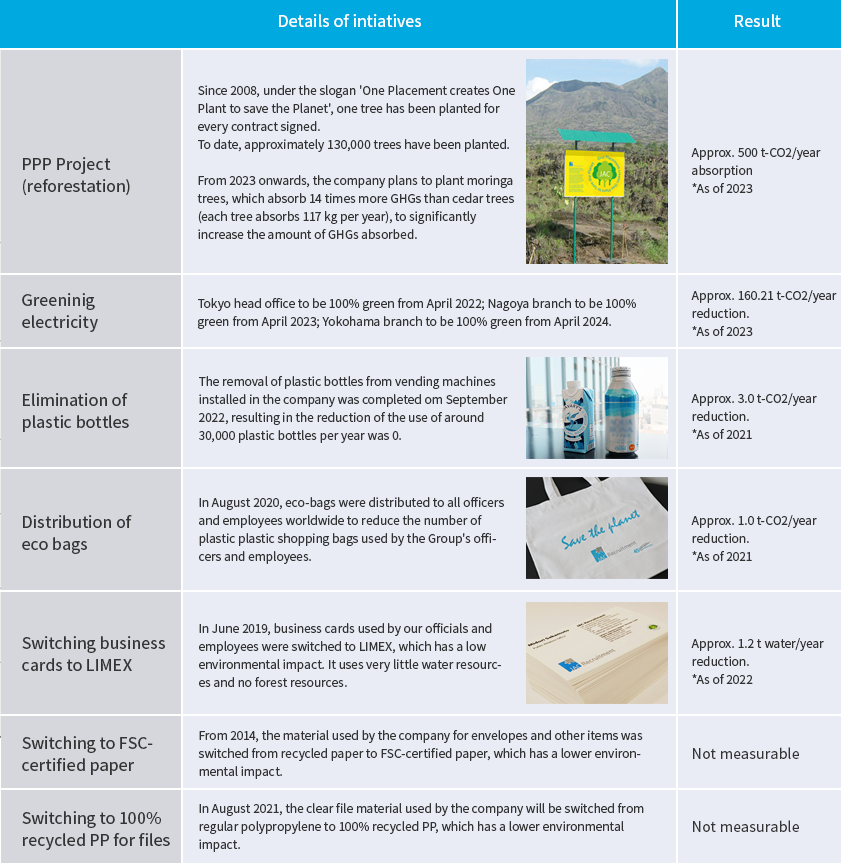
Sustainability
- My thoughts on SDGs, JAC Group Founder
- SDGs related initiatives
Environment
Social
Governance
Participation in Initiatives and External Evaluation
- ESG data